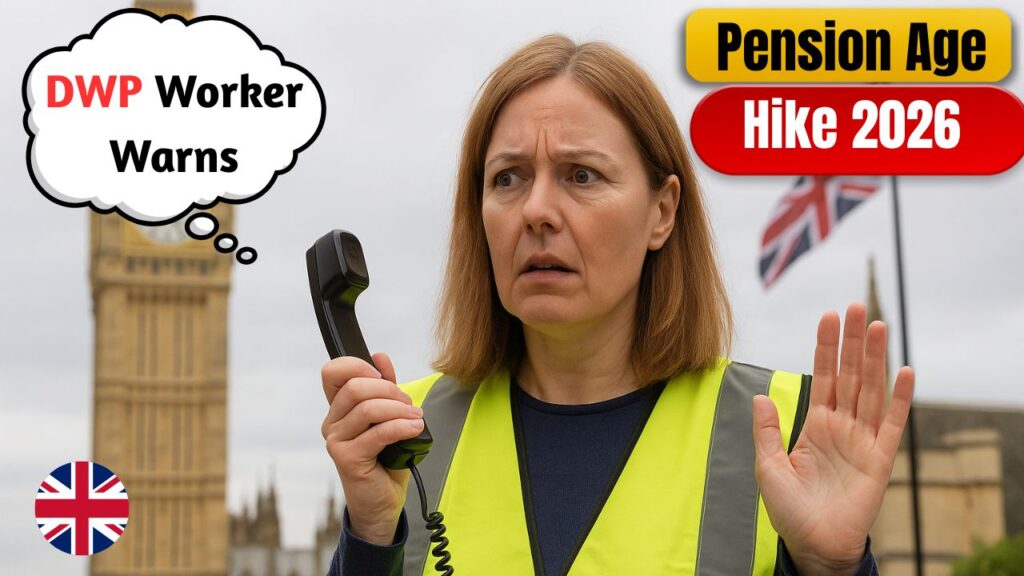The UK’s Department for Work and Pensions (DWP) has sparked public concern after reports emerged that the official pension age could rise from 66 to 67 by 2026. A DWP worker has reportedly raised alarm about the possible impact this could have on millions of future pensioners, especially those nearing retirement. With cost-of-living pressures already affecting households, this change could delay access to State Pension benefits by at least one year. Let’s explore what this means for UK citizens, when it could take effect, and who may be affected most by the 2026 pension age hike.

New DWP Pension Age Rules in 2026: What Changes Are Expected?
According to the latest reports, the DWP is considering moving the UK State Pension age from 66 to 67 earlier than originally planned. Currently, the rise was expected between 2026 and 2028, but insiders warn that it could now begin in early 2026. This adjustment is said to reflect increasing life expectancy and growing fiscal pressures on the UK government. However, critics argue that working people in manual or health-straining jobs could be disproportionately affected, as they would need to work longer before receiving their pension. The DWP has yet to confirm an exact date, but discussions are ongoing in Parliament.
Impact on Workers Approaching Retirement in the United Kingdom
If the DWP enforces the pension age rise to 67 by 2026, approximately 3.4 million people aged between 64 and 66 could see a direct impact on their retirement plans. Many individuals who were counting on retiring at 66 may now have to wait an additional 12 months to claim their full pension. The change may also influence National Insurance contributions, pushing older workers to stay employed longer. Financial advisers are urging workers nearing retirement to review their pension plans, assess private savings, and explore other benefits to minimize the effect of this delayed pension eligibility.
DWP Worker’s Concerns: Fairness and Financial Pressure on Citizens
The DWP worker who raised the issue reportedly emphasized that the pension age increase could worsen financial strain for low-income earners and manual laborers. Many fear they might not physically be able to work longer due to health or job-related stress. The union representing DWP employees has also voiced concerns, stating that any such sudden change without adequate notice would be unfair. Campaigners are calling for a gradual phase-in approach, ensuring that those close to retirement age aren’t suddenly caught off guard by new DWP pension regulations. The government insists that a full review will be completed before any final decision.

Public Response and Possible Policy Review by the UK Government
The British public’s reaction to the proposed DWP pension age increase has been largely negative, with many calling it a “retirement setback.” Economic analysts believe the government might reconsider the 2026 timeline if public opposition continues to grow. The UK Parliament’s Work and Pensions Committee has reportedly received multiple petitions demanding further debate and clarity. While government officials defend the need for the change to maintain pension system sustainability, there’s growing pressure to balance fiscal responsibility with fairness to workers. Any official confirmation will likely arrive in early 2026 following the DWP’s final pension age review.
| Aspect | Current Rule | Proposed Change (2026) |
|---|---|---|
| State Pension Age | 66 years | 67 years |
| Expected Start Date | Between 2026–2028 | Early 2026 (unconfirmed) |
| People Affected | Born after April 1960 | Likely expanded to those born after April 1959 |
| Main Concern | Affordability for retirees | Delayed access to pension benefits |
| Government Response | Review pending | Under parliamentary discussion |
FAQs
Q1: When will the DWP increase the pension age to 67?
A: It is expected to happen around early 2026, though the exact date is not confirmed.
Q2: Who will be affected by the pension age rise?
A: Workers born after April 1959 could be impacted by the earlier pension age increase.
Q3: Why is the UK government increasing the pension age?
A: The rise aims to reflect longer life expectancy and reduce pension fund pressure.
Q4: Can the pension age change be stopped?
A: If public opposition and parliamentary debate succeed, the timeline could be delayed or modified.





